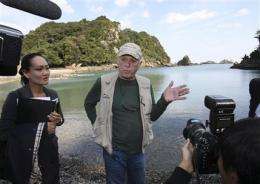Japan dolphin hunt town meets with activists

(AP) -- An unprecedented meeting between conservationists and leaders of the dolphin-hunting village depicted in the Oscar-winning film "The Cove" ended in bitter disagreement Tuesday.
The carefully organized meeting in Taiji was jolted beforehand when the film's star, Ric O'Barry, said he would boycott because severe restrictions had been imposed on the media covering the talks.
Taiji's hunt each year draws a range of protesters who videotape the slaughter and occasionally scuffle with local fishermen. This season - the first since the Oscar was awarded - the attention has been particularly intense, and the usually unresponsive town leaders agreed to a discussion at the town's community center.
But the two-hour meeting was acrimonious from the start.
"There's no compromise to be made. There will be no stopping of our activities until the harassment, capture and slaughter of both dolphins and whales on this planet ends," said Sea Shepherd member Scott West, who has been in the area for nearly two months to monitor the hunts.
Village fishermen defended the hunt as part of a centuries-long tradition, pointing out that Westerners kill other animals for food. Activists countered that the killings are barbaric - and that dolphin meat is laced with dangerous toxins.
"It's not right for you to force your values on us," said Town Council chief Katsutoshi Mihara.
O'Barry said he was upset over restrictions that included the banning of some major news outlets and accepting only pre-submitted questions selected by a Japanese moderator from a right-wing organization.
O'Barry told reporters while walking around the town that while the hunt was cruel, using dolphins as show animals was worse because the animals deserve freedom.
"I'm more upset with the trainers than I am with the men who are killing the dolphins," he said.
His actions angered the moderator, who had a phalanx of bodyguards, to the point that local authorities were called in and O'Barry left the town under police protection.
At the meeting, the activists were nearly all foreigners, including West from Sea Shepherd, a strident conservation group that has repeatedly clashed with Japanese whalers at sea, and other anti-whaling groups.
They sat opposite the stage from Taiji Mayor Kazutaka Sangen and other town officials, many of whom are proud descendants of whalers in Taiji, the small town of 3,500 that was the birthplace of Japanese whaling centuries ago.
In Tokyo, Chief Cabinet Secretary Yoshito Sengoku told a news conference that dolphin hunting "is part of Japan's long-held cultural tradition" and that he hoped the meeting would "promote understanding."
The hunts are legal under Japanese law. The village fishermen kill up to 2,000 dolphins a year, about 10 percent of Japan's total.
The town has long drawn the ire of activists. Unlike in other parts of the country, entire pods are chased into a sheltered cove, where some animals are picked for sale to aquariums and others are slaughtered close to shore.
Activists say about 100 have been killed so far this year, and West said several dozen more have been sold as show animals. The town does not release exact numbers, although the national Fisheries Agency publishes yearly figures by region - in 2008, the prefecture caught 1,857 dolphins.
©2010 The Associated Press. All rights reserved. This material may not be published, broadcast, rewritten or redistributed.



















